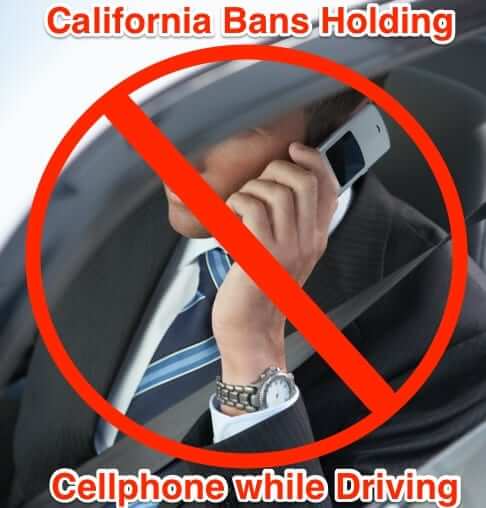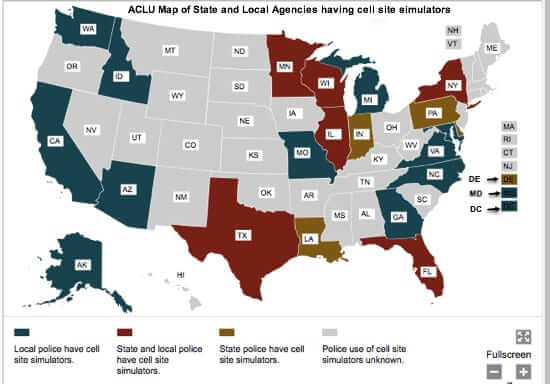Tag: cellphone
It is Now Illegal to Hold a Cellphone to Your Ear While Driving in California
A law that was passed in California last year, and that went into effect on January 1, 2017, makes it illegal for anyone operating a motor vehicle to hold a cellphone in their hand while driving. Assembly Bill 1785 (“AB 1785”) criminalizes “driving a motor vehicle while holding and operating a handheld wireless telephone or a wireless electronic communication device.”
How to Turn Your Cell Phone Into a Wifi Hotspot: WMWifiRouter
Turn your cell phone into a wifi router with WM WIfi Router! No more trying to figure out how to tether your laptop with your mobile phone; now your phone can be a wireless access point for any wifi-enabled device, be it laptop, another phone, or even a desktop computer! With WM Wifi Router you can turn your cell phone into a wifi hotspot effortlessly, and it works on dozens of different mobile phones!
Stingray IMSI Cell Phone Tower Emulator that Grabs All Your Cell Phone Data as You Drive By Deployed by Law Enforcement Around the Country
Stringray device phone technology tricks your cellphone into connecting to the Stingray ‘phone tower’ (your phone doesn’t realize it’s connecting to a cell phone simulator interceptor rather than your provider’s tower – it’s the ultimate in cell phishing), and then sucks down all of your International Mobile Subscriber Identity (IMSI) information, including not only your call details, but even your text messages, email, and other private information. (This is also known as an IMSI catcher.) Now being deployed by local police and sheriff departments, these cell phone interception and eavesdropping devices are not only legal, but they require no warrant, and their use is jealously protected by the Feds.
Scammers Run Up Your Cell Phone Bill with One Ring – Read How They Do It
The “One Ring” and “Missed Call” cell phone scam is becoming more common. According to both the FTC and the FCC, the way this works is that you will get a call from a number that you don’t recognize, starting with what seems to be a U.S.-based area code, such as 809, 876, 649, 268, 473, or 284. The scam is that when you call back to see who it is trying to reach you, you are actually connected to an international “pay per minute” or “pay per call” line, that will run up your phone charges.
The Supreme Court Cell Phone Search Decision in Riley in Plain English
Today the Supreme Court unanimously held that a warrant is required to search a cell phone, in the case of Riley v. California. Warrentless searches of a cell phone are not ok.
Unlock Your Cellphone, Go to Jail: Change in U.S. Law Makes it Illegal to Unlock Your Cell Phone
Believe it or not, as of Saturday, 2/2/13, it became illegal to unlock your cell phone. Or to unlock anybody else’s cell phone. The failure by the LIbrary of Congress to renew an unlocking exemption to the DMCA means that you must seek permission from the carrier or phone manufacturer before you can unlock your cell phone. If you don’t? You can face prison time. Just ask Sina Khanifar, who in fact was threatened with up to 5 years in prison. His crime? Unlocking his Motorola Razr.
Study Finds Personal and Banking Data Likely Accessed on Found Cell Phones Before Being Returned to Owner: How to Protect Yourself
Internet security firm Symantec (proprietors of, among other things, Norton Anti-Virus) have released the results of research that they have dubbed the “Honey Stick Project”. In Project HoneyStick, researchers “lost” a total of 50 cell phones in various cities around North America, including NYC, Washington D.C., LA, San Francisco, and Ottawa, Canada. The aim was to see what the average citizen would do with a found cell phone: would they try to reunite it with its owner, or would they do something more sinister with it? It turns out that the answer is “both”.
Feds Call for Complete Talk and Text Cellphone Ban for Drivers
The National Transportation Safety Board (NTSB) this week called for a complete, total ban on both talking on cell phones (even hands-free), and texting, by drivers. The recommendation, intended to reduce accidents resulting from “distracted driving” followed the Federal agency’s review of accidents resulting from a distracted driver – a problem so serious that the NTSB says that at any moment during any day, approximately 13.5 million drivers are using a cellphone. Last year alone, nearly 3100 fatal accidents were known to be the result of distracted drivers, and the number of accidents attributable to talking or texting drivers is undoubtedly far higher when you include non-fatal accidents, and consider that few drivers will admit that they were texting or on the phone behind the wheel.
Pending Legislation Would Allow Robo Calls to Your Cell Phone
You know those annoying automated calls that result in a robotic voice saying “Please hold for an important message”? Well, new legislation, if passed, would allow them to your cell phone! A concerted effort by several legislators and large businesses has resulted in Federal bill HR3035, which would allow businesses to initiate automated calls (so called “robo calls”) to cell phones whose owners have ‘given permission’ for the robocalls. “Permission” for robodialing is defined as providing your cell number to the business at any time (even years ago), and in just about any context – just having provided your cell number at any time past or present is enough, you don’t have to say “and please robo dial me.” It’s kind of the “they asked for it” theory of automated dialing phone spam. (Note: This article includes links to make it very easy for you to write to your representative to register your displeasure with this assault on your privacy.)
How to Apply Parental Controls to Restrict Web Access, Calls and Texts on Your Child’s T-Mobile Cell Phone
If you are wanting or needing to give your child a cell phone, but want to be able to apply parental controls to restrict access, or even to make their access fully restricted access with them being able to call just a few numbers that you designate, then here is how to do it with T-Mobile. It is important that you understand these steps, and that you both a) don’t let Tmobile tell you that it can’t be done, and (equally important), b) don’t believe T-Mobile when they tell you that it has been done. You will need to do it – or at least check that T-Mobile has really done it – yourself. Here is how to lock down your child’s cell phone account and access, and apply full parental controls, so that they have no Internet access, and can only call and text to pre-approved numbers.
Lawsuit Filed Over Airport Searches of Laptops and Cell Phones
When you’re going through the security gates at an airport, you’re most likely resigned to the fact that your bag will be searched, regardless of whether there is a reason to do so. But what about your computer, laptop, or cell phone, with the overwhelming amount of personal information it contains – do you expect that to be searched? You should, as Lisa Wayne found out the hard way when her laptop was whisked away and subjected to a half-hour search. It turns out this is fairly routine. Now a law suit has been filed by Wayne and others to out a halt to this practice (some would say ‘abuse’) by the TSA and Department of Homeland Security (DHS).
Maine, San Francisco Contemplating Requiring Radiation Warnings on Cell Phones
What is the truth about cell phones and radiation? While many will tell you that the jury is out – and others will tell you that there is no (conclusive) evidence – many feel that cellphone use presents a health risk in electromagnetic (ionizing) radiation, particularly for children. The reality is that short term studies have found no correlation between cell phone radiation and health problems such as cancer, however the other reality is that there are no long term studies (say, of greater than 10 years) yet, as it is only relatively recently that cellphones have been so commonplace. Of course, the cell phone industry says there is no risk – but that’s what the tobacco industry said too. Now the state of Maine is contemplating requiring cell phones to carry a warning label.
How to Get Caught After Stealing a Cell Phone
We’ve covered our share of people doing stupid things with cell phones, but this one deserves a special entry all of its own.
How to Email a Text Message to a Cell Phone
As text messaging grows ever more popular, you may be wondering how to send text messages to cell phones via the Internet or, put another way, how to send a text message to a cell phone by email. It’s actually very easy to email a text message to a cell phone – in fact it’s as easy as sending any other email – you just need to know the email address of the cell phone.
New Colorado Texting Law Goes into Effect – No Texting While Driving and No Calls if You’re Under 18
A new Colorado “texting while driving” and “yakking on the phone while driving” law goes into effect at midnight. Starting on the 1st of December, under the new law, it is a criminal offense to text or otherwise enter data into a mobile device, from behind the wheel, while the vehicle is in motion. The new law also prohibits drivers under the age of 18 from using a cell phone at all while behind the wheel, hands-free or not.







